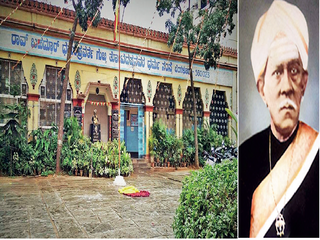An inn set up by Gubbi Thotadappa, the legendary philanthropist, continues to host tourists and students
If any one expects a favour free of charge, ‘Is it a Gubbi Thotadappa Choultry? would be the instant colloquial reaction. Gubbi Thotadappa choultry, close to Bangalore City Railway station and Kempegowda Bus Terminal, is perhaps the oldest non-governmental organisation in the city.
Bangalore has several free hostels belonging to particular communities, but running a dhramashala — a free choultry (inn) for the visitors or tourists, and continues to do the same even after a century is a remarkable feat.
This noble act is the brainchild of Gubbi Thotadappa, who was born in 1838 into a Lingayat-Veerashaiva family at Gubbi in Tumakuru dist. Later, his family moved to Bangalore and he started his business in Mamulpet in the city. In his house, he started offering shelter to students who were coming to Bangalore for studies. Similarly, he opened doors to traders coming from faraway places. When this number increased, he decided to use all his property to the benefit of such traders and students. He bought land from Railways in 1897 and built a choultry which had 10 rooms for students to stay. On February 11, 1903, Krishna Raja Wadiyar IV officially opened dharmashala for visitors coming to city and free hostel to students belonging to Lingayat-Veerashaiva Community.
As he had no children, he donated all his property and founded a trust called Rao Bahadur Gubbi Thotadappa Charity in 1910, and appointed K P Puttanna Chetty as its first president. Since then subsequent office-bearers are carrying out the work as per the wishes of the founder. During Dasara celebration in 1905, he was awarded the title Dharmapravrta, a royal recognition given by the Maharaja of Mysore. In 1910, he was honoured with a title Rao Bahaddur by the British Government. On 21 February, 1910, he died at the age of 72.
The choultry he built was very helpful then for traders arriving in the city to buy or sell things. Minister for Horticulture Shyamanur Shivashankarappa still remembers the days when he would come here by night train from Davanagere and the choultry was very helpful for people like him to take shelter here for a day or two. Even today, the lodging facility offers accommodation at a nominal rate and it is open to all irrespective of region or religion, caste or creed, position or property. It was 25 paise per day. Over a period of time it was raised to Rs 10 and now it Rs 35. The money collected is spent on maintenance of the choultry. At any given time of the day, at least 50 to 60 visitors stay here. It is much-sought-after shelter to countless number of visitors coming even from other places as its name is spread far and wide. Similarly, the free hostel has been a boon to economically poor students .
The trust awards scholarships for academic achievers of the community every year. They maintain hostels at 16 different towns in the state. The hostel facility is given for both boys and girls of the students of Lingayat-Veerashaiva community. Revered Dr Shivakumara Mahaswamiji of Siddhaganga Math Tumkuru was a student in this hostel during 1927 to 1930. S Nijalingappa , one of the chief ministers of Karnataka, was an inmate between 1921 and 1924. Likewise, education minister Sri DH Chandrashekaraiah, accountant general Sri DH Veeraiah, Karnataka state police chief H Veerabhadraiah, and many more such illustrious personalities were benefited by this hostel. While unveiling the statue of Gubbi Thotadappa in 2005, Nijalingappa said: “If this noble person had not started the hostel, economically poor students like me would have spent rest of my life working as labourers in cultivating fields”
In Mamulpet, the old residential building of Gubbi Thotadappa was removed and a shopping complex has been constructed.
During centenary year, the trust built Bell Hotel as a source of income to spend on all its charitable projects. There is also an aesthetically built conventional hall in this building. Every year on the death anniversary day of the founder, in Mythic Society, on Nrupathunga Road, the trust arranges an endowment lecture from eminent scholars on various subjects.
Hostel inmates are given training in personality development by experts. The original Dharmashala building still retains its original form. The century-old building represents the tradition of hospitality for which our city is known.
Whereas the centenary building built with modern architectural style represents modern Bengaluru. There are many lodges in the vicinity of railway station and bus stand. They may have tall buildings, but Gubbi Thotadappa Choultry stands tall as a symbol of humanity.
(The author is a historian)
source: http://www.bangaloremirror.indiatimes.com / Bangalore Mirror / Home> Bangalore> Others / by Suresh Moona / Bangalore Mirror Bureau / September 26th, 2017
